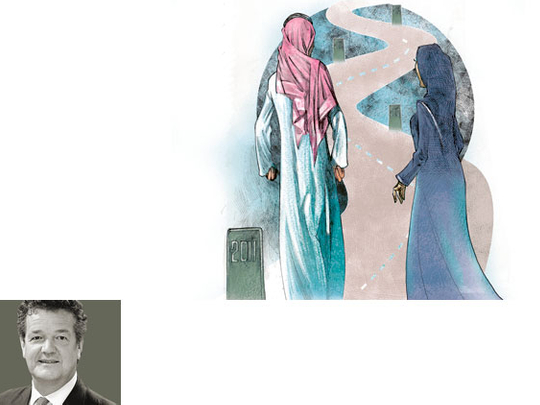
Last week an Emirati friend sat with me and looked at some old pictures of the UAE's very early days. He looked up at me and said with quiet pride: "We really did build a nation." It is that sense of solid achievement that the whole of the UAE is celebrating tomorrow with the country's 40th National Day.
My friend's words echoed one of the first interviews I published in the UAE, when I spoke in 1984 to Shaikh Nahyan Bin Mubarak Al Nahyan, then chancellor of the UAE University, and he was very clear about the importance of the "federation generation".
His point was that the UAE University was giving its students more than education. For the first time, young UAE men and women were meeting outside family, tribe, or emirate. They were meeting as young individuals, and building friendships that crossed the different emirates, building a new ‘Emirati' spirit.
Over the decades this spirit has grown, and this week's astonishing outburst of flags, rosettes, painted cars etc, is a symbol of the healthy national pride of the present day Emiratis in their country.
When celebrating this success, it is important to remember that the UAE did not have an easy start. The initial nine emirates that were discussing a federation had never been united politically, and a federation would require each ruler to surrender some of his sovereignty into the new political entity. Indeed, during 1970 and 1971 as the debate raged on how to form the federation, Qatar and Bahrain decided to go their own way and did not join the seven emirates which eventually formed the UAE.
After the federation was launched in 1971, it took some years for the new country to find the right balance of authority between the new federal government, often seen as being part of Abu Dhabi's agenda; or in a more devolved form of government with more authority residing with the seven emirates, often seen as a more Dubai agenda.
This element of competition between the two largest emirates was resolved by the commitment to the spirit of the UAE by both Shaikh Zayed Bin Sultan Al Nahyan, who as Ruler of Abu Dhabi and the first President of the UAE was crucial in articulating the new vision; and Shaikh Rashid Bin Saeed Al Maktoum, who was Ruler of Dubai and Vice-President of the new federation, and later also became Prime Minister in 1979, who made very clear that arguments about the structure of government did not mean any failing in commitment to the federation.
But the UAE's challenges were not just internal. The country was launched in a hostile international environment. It is hard today to reconstruct the serious pressures on the emerging new nation, since the regional picture in 1971 was so very different. The world was divided between two superpowers the US and the USSR, and small nations were forced to take sides.
Challenges
The Gulf Cooperation Council did not exist until 1981; the Shah ruled Iran; and Egypt and Syria were vigorous Arab Socialist powers, whose leaders had huge appeal across the whole Arab World.
These Arab Socialist republics did not like the traditional monarchies of the Gulf, and had a history of seeking their failure: in the 1960s Egypt had backed the republicans in the Yemeni civil war to topple the former ruler. In addition, as the British prepared to leave the Gulf, the Shah saw a chance to cause mischief and launched a spurious claim to three islands of the UAE, as well as Bahrain, no doubt with an eye on their oil wealth.
Further, the Marxist government of South Yemen was active in supporting the People's Front for the Liberation of the Arab Gulf, sending up cadres of its undercover forces into the emirates to seek revolution.
Forty years on, the UAE can take pride in its achievements. The federation has grown to become an essential part of the political thinking and identity of UAE nationals, and while there are continuing debates on how to take the country forward, there is no doubt that it is one nation.
There are obvious challenges ahead, and there is still a long way to go. The new Federal National Council is due to take a more active part in the governing of the country. The federal government has still not established itself as an effective force in some areas of administration, where there will be a need for better coordination leading to more unified federal policies.
The obvious economic success of the UAE's major cities has not been matched by bringing opportunity and wealth to large sections of the UAE's rural population, who continue to live in stark simplicity. And the UAE will need to shift its economy to more knowledge-based skills that will flourish in the 21st century, relying on the education that its people have acquired.
But the obvious popular pride in what the UAE can do is an indication that the UAE people and the leaders are sure that they will find a way forward. There will certainly be mistakes on the way, but they can be corrected, as had happened in the past.
Looking back over the solid achievements of the past 40 years, gives greater confidence in a successful future.












